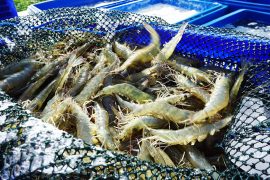
New study details the environmental impact of oil palm plantations
“While the general result was anticipated, our review revealed a breadth of environmental and societal detrimental impact, from local to global scales,” says Prof. Dr. Kerstin Wiegand from the Department of Ecosystem Modelling at Göttingen University. “The review provides a powerful tool for decision support and policy-making on the basis of a balanced and detailed view of all functions.” New study details the environmental impact of oil palm plantations

Oil palm plantation
One outcome of the study is that the largest negative effects occur at the stage of forest clearing, indicating that oil palm plantations should only be established on already-converted landscapes. The loss of ecosystem functions can be mitigated to some degree, sometimes by simple means such as the use of cover crops, mulch and compost. Nevertheless, forest conversions should be avoided by all means when it comes to peatland, which is especially prevalent in oil palm-growing regions. When peatlands are drained to establish plantations, large amounts of carbon dioxide are released – with dramatic, long-lasting and almost irreversible effects. New study details the environmental impact of oil palm plantations
The study also reveals numerous research gaps, in particular with respect to socio-cultural information functions. In almost all societies, forest has an important cultural significance and fulfills certain medicinal, spiritual or ritual functions. “If and which of these functions are fulfilled by oil palms has not been researched enough yet,” says Prof. Wiegand. “There is a need for empirical data from different regions and from plantations of different ages. And more research is needed on developing effective management practices that can off-set the losses of ecosystem functions.”
###
Publication: Claudia Dislich et al. A review of the ecosystem functions in oil palm plantations, using forests as a reference system. Biological Reviews 2016. Doi: 10.1111/brv.12295. http://dx.
The study was part of the collaborative research centre Ecological and Socioeconomic Functions of Tropical Lowland Rainforest Transformation Systems (EFForTS), which brings together more than 200 scientists from natural sciences, economics and social sciences. EFForTS is a collaboration between Göttingen University and research institutions in Indonesia, including the Universities of Bogor, Jambi and Tadulako. For further information see http://www.
Contact: Prof. Dr. Kerstin Wiegand
University of Göttingen
Faculty of Forest Sciences and Forest Ecology – Department of Ecosystem Modelling
Phone +49 551 39-10121
Email: kerstin.wiegand@uni-goettingen.de,
Web: http://www.
Dr. Guy Pe’er
Helmholtz Centre for Environmental Research (UFZ), Department Conservation Biology
e-mail: guy.peer@ufz.de













